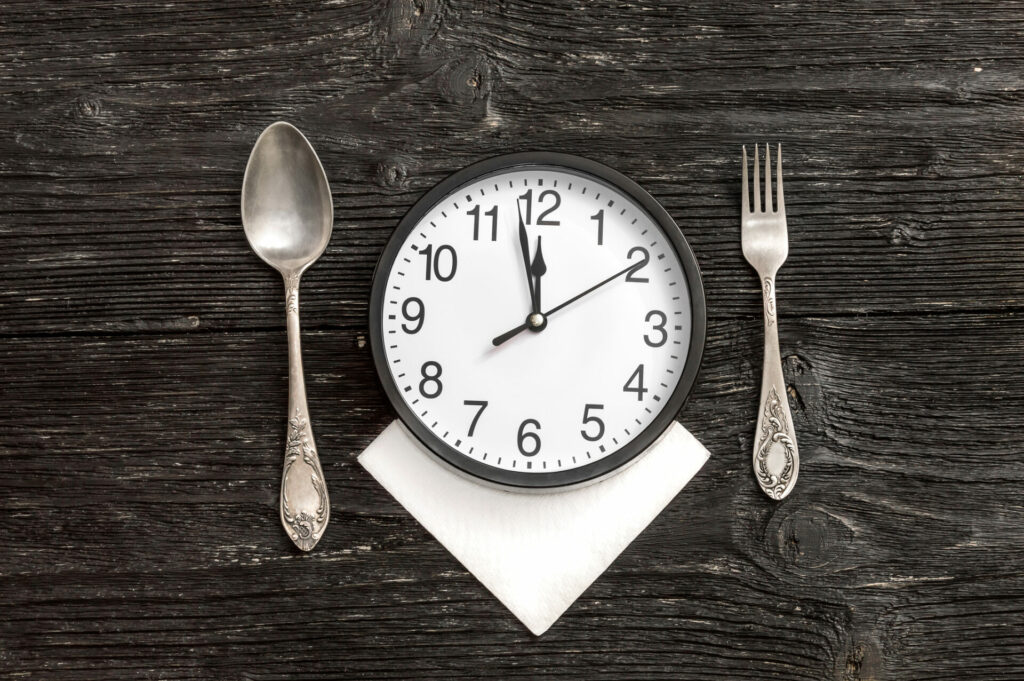Do you find yourself snacking at night more often than you’d like? Are you worried about the impact that nighttime eating might have on your weight? If so, you’re not alone. A lot of people struggle with eating at night, and many are concerned about the possible consequences. In this blog post, we will discuss everything you need to know about eating at night and weight gain. We’ll talk about the causes of the night-eating syndrome, as well as the effects that it can have on your body. By the end of this post, you’ll have a better understanding of why eating at night might be causing you to gain weight, and what you can do to stop it!
Contents
The Connection Between Eating At Night And Weight Gain
 There are a few different ways that eating at night can lead to weight gain. First of all, nighttime eating can disrupt your body’s natural circadian rhythm. This is the biological process that tells your body when it should be awake and when it should be asleep. When you eat at night, it can signal to your body that it’s time to be awake, which can make it harder to fall asleep and stay asleep. Lack of sleep is one of the major risk factors for weight gain.
There are a few different ways that eating at night can lead to weight gain. First of all, nighttime eating can disrupt your body’s natural circadian rhythm. This is the biological process that tells your body when it should be awake and when it should be asleep. When you eat at night, it can signal to your body that it’s time to be awake, which can make it harder to fall asleep and stay asleep. Lack of sleep is one of the major risk factors for weight gain.
Weight gain can also occur because people tend to eat more calories at night. Studies have shown that people consume about 300 extra calories per day when they eat between the hours of 11 p.m. and midnight. This is because late-night eating often leads to mindless snacking, and people are less likely to make healthy food choices when they’re tired.
Lastly, eating at night can cause weight gain because it can lead to acid reflux. Acid reflux is a condition in which stomach acid rises up into the esophagus, and it can be very painful. It can also damage the lining of the esophagus over time. Eating late at night can make acid reflux worse because lying down after eating can allow stomach acid to rise up more easily. This is why people with acid reflux are often advised to avoid eating late at night.
Causes Of Night-Time Eating
There are a few different things that can cause people to eat at night. For some people, it may be a matter of habit or boredom. They may not even be aware that they’re doing it! Some of the most common causes of night-time eating include:
Stress
Eating at night can be a way to cope with stress. After a long day, you may find yourself mindlessly snacking on unhealthy foods as a way to relax. Comfort food can also be a trigger for eating at night. If you’re stress eating, you may be more likely to make unhealthy food choices and overeat in order to satisfy your cravings.
Boredom
Another common cause of night-time eating is boredom. If you’re not tired and you don’t have anything else to do, you may find yourself snacking out of boredom. This is especially common if there’s food available that you know you shouldn’t eat. That bag of chips in the pantry may be calling your name, but try to resist the temptation!
Depression
Depression is the third most common cause of night-time eating. People who are depressed may find themselves turning to food for comfort. They may also have a hard time sleeping, which can lead to late-night snacking. You may be more likely to make unhealthy food choices when you’re depressed, so it’s important to get help if you’re struggling with depression.
Sleep problems
 Sleep problems are another common cause of night-time eating. If you have trouble falling asleep or staying asleep, you may find yourself snacking in the middle of the night. This is because people who are sleep-deprived tend to be more hungry, and they may make poor food choices when they’re tired.
Sleep problems are another common cause of night-time eating. If you have trouble falling asleep or staying asleep, you may find yourself snacking in the middle of the night. This is because people who are sleep-deprived tend to be more hungry, and they may make poor food choices when they’re tired.
Hunger
Eating at night can also be a sign that you’re not eating enough during the day. If you’re not getting enough calories during the day, your body may start to crave food at night. This is especially common if you’re trying to lose weight. When you restrict your calorie intake, your body may go into starvation mode and start to hold onto fat. This can lead to weight gain, even if you’re eating less food overall.
Poor planning
If you don’t have healthy food options available, you may find yourself snacking on whatever is available. This is especially common if you live in a place with limited access to healthy food. If you don’t have healthy food at home, try to make sure you have some healthy snacks with you when you go out. That way, you’ll be less likely to make unhealthy choices when you’re hungry.
Lack of willpower
Lastly, some people simply don’t have the willpower to resist late-night snacking. If you find yourself eating at night even when you’re not hungry, it may be a sign that you need to work on your self-control. There are a few things you can do to make it easier to resist late-night cravings, like keeping unhealthy food out of the house and keeping a healthy snack nearby.
As you can see, there are a variety of reasons why people may eat at night. If you find yourself snacking after dinner more often than you’d like, it’s important to try to identify the cause. Once you know what’s triggering your night-time eating, you can start to work on making some changes.
Effects Of Eating At Night
Different people may experience different effects of night-time eating. Some people may not notice any adverse effects, while others may gain weight or develop other health problems. Some of the most common effects of night-time eating include:
Weight gain
 Eating at night and weight gain are often connected. This is because people who eat at night are more likely to make unhealthy food choices and overeat. If you’re trying to lose weight, it’s important to be aware of the calories you’re consuming at night. You may need to cut back on late-night snacking in order to see results.
Eating at night and weight gain are often connected. This is because people who eat at night are more likely to make unhealthy food choices and overeat. If you’re trying to lose weight, it’s important to be aware of the calories you’re consuming at night. You may need to cut back on late-night snacking in order to see results.
Digestive problems
Eating late at night can also cause digestive problems. This is because your digestive system slows down when you sleep, which can make it harder to digest food. If you eat right before bed, you may wake up feeling bloated or gassy. You may also be more likely to experience heartburn and indigestion. Try to eat your last meal at least a few hours before you go to bed.
Sleep problems
Night-time eating can also interfere with your sleep. If you eat right before bed, you may have trouble falling asleep. And if you wake up in the middle of the night to snack, you may have trouble going back to sleep. This can lead to fatigue and make it hard to concentrate during the day. Avoid eating late at night if you’re trying to improve your sleep and get enough rest.
Mood problems
Night-time eating can sometimes be a sign of an underlying mood disorder. If you find yourself overeating even when you’re not hungry, it may be a sign of depression, anxiety, or another mental health condition. If you’re concerned about your nighttime eating habits, talk to your doctor. They can help you identify any underlying issues and develop a plan to address them.
Blood sugar problems
Eating at night can also cause blood sugar problems. If you eat right before bed, your blood sugar may spike and then drop quickly. This can leave you feeling tired and hungry in the morning. It can also lead to cravings and overeating later in the day. If you have diabetes, it’s especially important to avoid eating late at night. Eating at night can cause your blood sugar to drop too low, which can be dangerous.
These are just a few of the potential effects of night-time eating. If you’re concerned about your nighttime eating habits, talk to your doctor. They can help you identify any underlying issues and develop a plan to address them.
How To Avoid Weight Gain From Eating At Night?
 If you’re trying to lose weight or avoid weight gain, there are a few things you can do to limit the effects of night-time eating.
If you’re trying to lose weight or avoid weight gain, there are a few things you can do to limit the effects of night-time eating.
- First, try to eat earlier in the evening. This will give your body time to digest your food before you go to bed. When you eat early, you’re also less likely to experience cravings later on. This will help you avoid overeating and eventually weight gain as well.
- Second, make sure you’re eating healthy, balanced meals. Avoid high-fat, high-sugar foods that can cause weight gain. You can have a light snack before bed, but make sure it’s something that won’t sabotage your diets like a piece of fruit or yogurt.
- Third, make sure you’re getting enough sleep. Sleep deprivation can increase your appetite, so it’s important to get enough rest. When you are well-rested, you’re less likely to crave unhealthy foods.
- Fourth, exercise regularly. Exercise can help you burn calories and manage your weight. It’s also a great way to reduce stress. When you are physically active, you’re less likely to turn to food when you’re feeling stressed or anxious.
- Finally, if you find yourself snacking at night more often than you’d like, try to identify the cause. Once you know what’s triggering your night-time eating, you can work on addressing it. For example, if you’re eating at night because you’re bored, try to find a way to occupy your time.
Night-time eating can be a difficult habit to break, but it’s important to try if you’re concerned about the effects it’s having on your health. Talk to your doctor about ways to stop night-time eating and avoid weight gain. With a little effort, you can break the cycle of night-time eating and improve your overall health.
Conclusion
Eating at night can definitely lead to weight gain, but it doesn’t have to. If you’re mindful of your portion sizes and make sure to eat healthy foods, you can avoid packing on the pounds. So next time you’re feeling hungry after dinner, think about what you’re eating and how it will affect your weight. With a little planning, you can enjoy a late-night snack without sabotaging your diet. With proper care, you can avoid weight gain from eating at night and keep your body healthy and happy.
If you need more information on the causes of weight gain, contact Mantra Care. We’re here to help you on your journey to a healthy lifestyle. Our team of experts will help you in developing weight management programs that are tailored to your specific needs and goals. You can also get in touch with our nutrition experts through our online nutrition counseling, who can guide you through the process and help you achieve your fitness goals.


